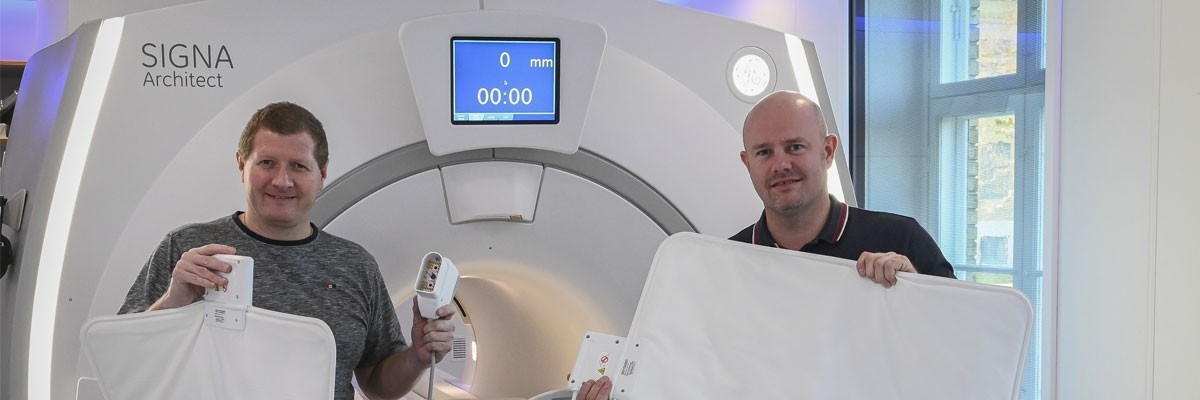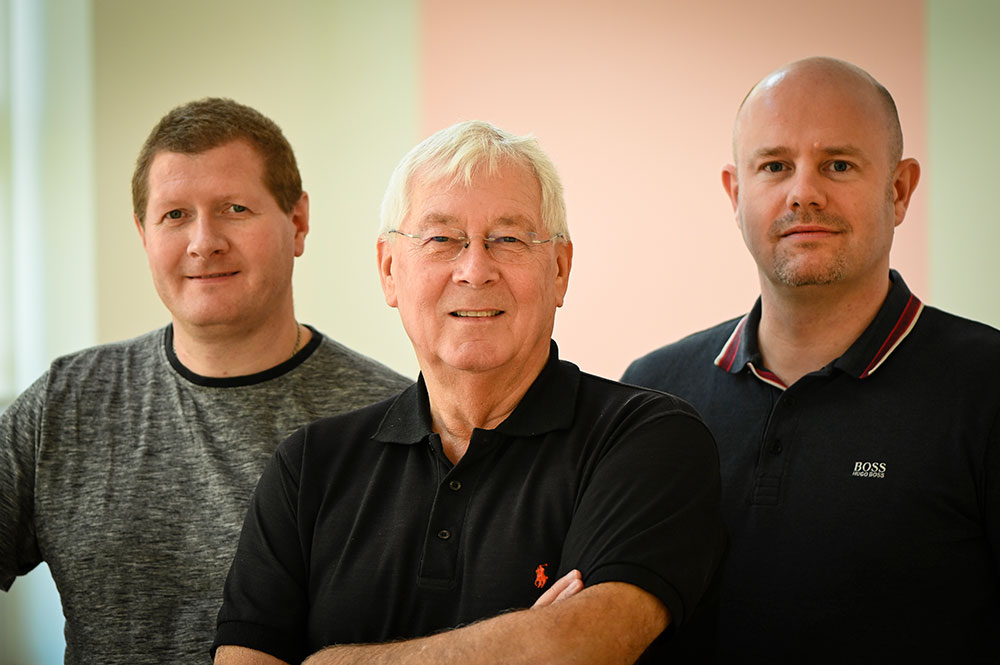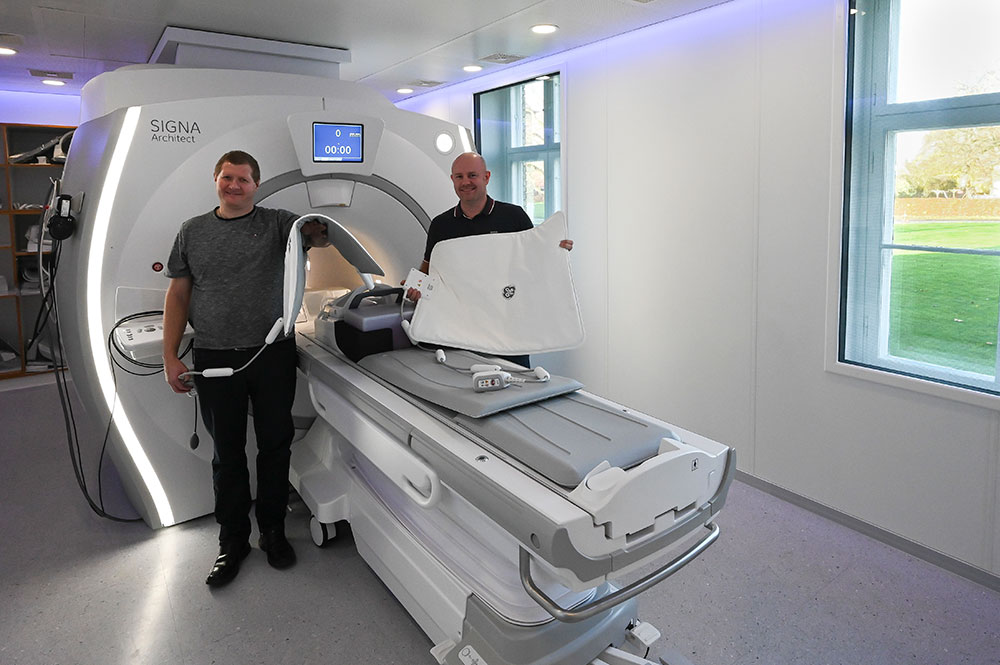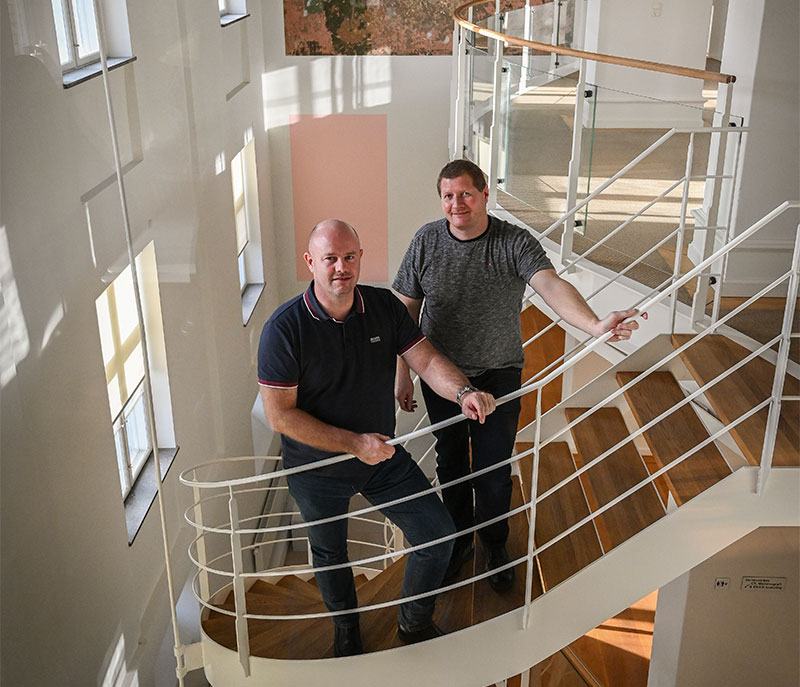One of the primary goals of the private clinic Progardia in Middelfart, Denmark is to produce optimal MR imaging for the assessment of prostate cancer, as well as providing their patients with an experience that minimizes any potential stress or fear they may feel. To help achieve these goals, they have invested in GE Healthcare's 3.0T SIGNA™ Architect MRI scanner.
It's not just about creating the very best MR images, but also the very best patient experience."
"It's not just about creating the very best MR images, but also the very best patient experience," says Niels Thagaard, innovator, investor, and day-to-day director of Progardia. "Our goal is to offer the best MRI-based assessments and studies of prostate cancer--among other things--in Denmark. This requires that we not only invest in high-end equipment, but also in experts skilled in operating the scanner and creating the best experience for our customers and patients. We attach almost as much importance to the latter as we do to the medical part."
Opened on December 1, 2020, Progardia is a highly specialized private clinic in Middelfart in Denmark. Niels Thagaard is the innovator, investor, and day-to-day director of the new clinic; he has over 20 years of experience in setting up MRI centers, including those associated with Hamlet Private Hospital and Aabenraa Hospital, also in Denmark.
"We believe there is an unmet demand for MRI procedures that provide the best starting point for diagnosis, as well as addressing the anxiety and discomfort that several patients experience, while they are being scanned in the MRI."
Photo from left: Per Ulrich, MRI specialist; Niels Thagaard, Director of Progardia Healthcare; and Kim Jensen, Chief radiographer and MRI specialist.
MR imaging for diagnosing prostate cancer
"We believe there is an unmet demand for MRI procedures that provide the best starting point for diagnosis, as well as addressing the anxiety and discomfort that several patients experience, while they are being scanned in the MRI. Some patients will experience claustrophobia when they are lying in the MRI scanner. For some people, this almost overrides the fear of any potential disease and more generally, it can be a hurdle that prevents a significant number of people from coming forward. This could lead to later diagnosis and impact the success of any subsequent treatment," says Thagaard.
Thagaard drew his inspiration for the clinic in Middelfart while attending RSNA, the International Congress of Radiology held in Chicago by the Radiological Society of North America. Clinicians in the United States have extensive experience using 3.0T MRI scanners for the diagnosis of diagnosing prostate cancer, which is a primary area of focus for the clinic. He works alongside Kim Jensen (Chief Radiographer and MRI specialist) and Per Ulrich (MRI specialist). Both bring decades of experience in MRI and other diagnostic imaging procedures.
Thin coils with close bodily proximity counteract discomfort
Without question, the main advantage of the new scanner is the special AIR™ coils developed by GE Healthcare, explains Kim Jensen, Chief radiographer and MRI specialist: "Compared to traditional body coils, which are often both heavy and rigid, the AIR coil is thin, lightweight, and easy to fold closely around the torso, arms, legs, etc. We believe it will greatly reduce the feeling of discomfort patients may experience with traditional body coils. Another advantage is that the coils from GE Healthcare can overlap physically without compromising the result. This is not possible with traditional body coils."
"Compared to traditional body coils, which are often both heavy and rigid, the AIR coil is thin, lightweight, and easy to fold closely around the torso, arms, legs, etc.
We believe it will greatly reduce the feeling of discomfort patients may experience with traditional body coils. Another advantage is that the coils from GE Healthcare can overlap physically without compromising the result. This is not possible with traditional body coils."
When the coil is wrapped closely around the patient, you get more MR signal from the body allowing us to run quick acquisitions with good image quality. This is made possible because AIR coils contain many coil elements so they can be positioned close to the anatomy being imaged.
Extra-powerful 'binoculars' keep the hydrogen atoms sharply focused
In addition to AIR coils the SIGNA Architect has other advantages. "There are several reasons why we chose a GE Healthcare MRI scanner as the best solution for our patient approach here," Kim Jensen explains.
"We purchased a 3.0T scanner because we need to perform diffusion measurements of the prostate, a scanning technique that needs the high signal intensity which the SIGNA Architect machine delivers. One might say that a high intensity signal is indicative of how powerful our 'binoculars' are when focusing on the hydrogen atoms that make up the images of an MRI scan." MRI specialist Per Ulrich elaborates further:
"A 3.0T scanner has a magnetic field that is up to 60,000 times stronger than the Earth's magnetic field. This gives us a much better signal to work with when compared to a 1.5T scanner. At the same time, the SIGNA Architect's magnetic field is very homogeneous, which allows the radiography team to produce images that are larger than 40 cm in size. This is an advantage for both the patient and for the radiographer." For example, when scanning a patient’s back, we no longer need to compose a full image of the back from three stacks of scans, instead we only need two scans reducing the time the patient spends inside the scanner."
MRI specialists Per Ulrich and Kim Jensen from Progardia Healthcare, holding the flexible and lightweight AIR coils in front of their newly acquired MRI scanner.
The goal is to provide the patient with a comfortable experience
Both Kim Jensen and Per Ulrich have high expectations for their 3.0T MRI scanner.
Kim has a special interest in the patient experience during MRI scanning: "From my time as a department radiographer for MR imaging at Kolding Hospital, I know how important it is to focus on the right environment and on the patients comfort. For example, when I participated in the Children Centered Care Project, we managed to reduce by 50% the number of children that needed to be sedated prior to an MRI. At Progardia, we do not focus specifically on children, but we can certainly expand on the experiences from the project in Kolding, and the SIGNA Architect will allow us to do that," Kim Jensen explains, pointing to several related advantages. "We purchased a 3.0T scanner because we need to perform diffusion measurements of the prostate, a scanning technique that needs the high signal intensity that the SIGNA Architect machine delivers."
"We purchased a 3.0T scanner because we need to perform diffusion measurements of the prostate, a scanning technique that needs the high signal intensity that the SIGNA Architect machine delivers."
First, the opening where the patient lies, which is where claustrophobia may be triggered, is 70 centimeters in diameter, in contrast to smaller systems that have 60 centimeter openings. In addition, newly developed technology allows for a significant reduction in noise from the scanner.
Progardia have added other elements to help deliver a comfortable patient experience. The team has decorated the MRI room, using light sources that provide a friendly environment. Most places have their scanning rooms in a basement, instead Progardia installed the SIGNA Architect on the ground floor of the clinic with a view of lawns and open skies through a large window. And using a specialized mirror device, patients have the option of watching their choice of movies during the examination. All of these factors help to reduce any stress the patient may feel before and during their MRI scan.
Intuitive user interface
"Naturally, we also have high expectations for the scanner as a tool for our daily work," Per Ulrich explains.
"GE Healthcare has provided us with high-quality training for the scanner's many features. For the most part, it was 'born' to be user-friendly. For example, it is easy to create an overview when planning your study. When examining an arm, you touch a graphical depiction of an arm and the appropriate protocols and procedures for scanning an arm automatically appear. It is very intuitive in this sense."
Progardia is located in the newly restored administration building of the former psychiatric hospital in Middelfart, amongst green surroundings and close to the sea, Lillebælt. They are co-located with seven medical consultants, each with their own specialist areas within oncology, neurology, musculoskeletal (abdominal) matters, and cardiology.
Learn more about the SIGNA Architect
Learn more about AIR technology




